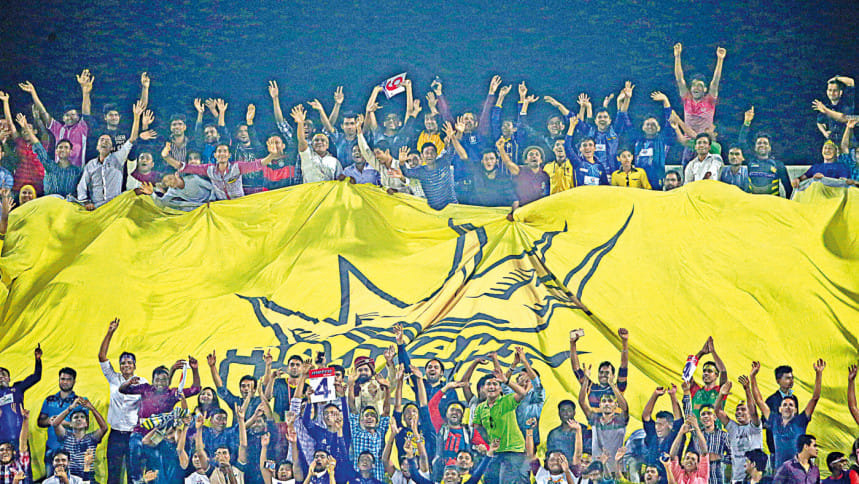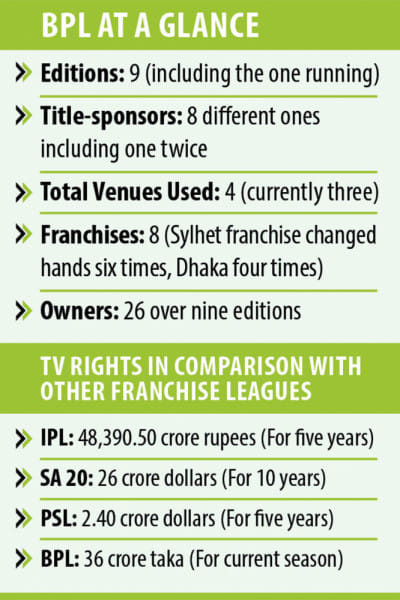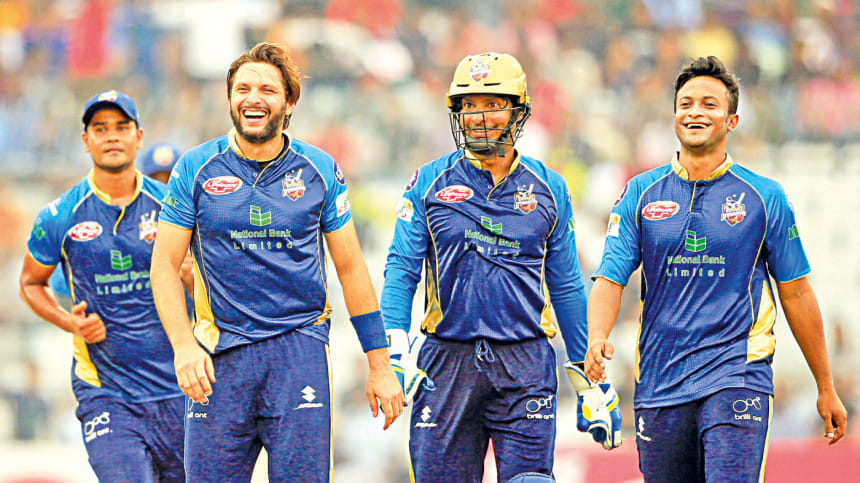BPL and the slippery pole trouble

Back when the inaugural season of the Bangladesh Premier League (BPL) rolled out in 2012, the idea of a franchise-based T20 league was not yet conceived by the Pakistan Cricket Board, and they did have the means to turn it into reality due to various reasons. Born four years after the BPL, however, the Pakistan Super League's (PSL) TV rights were sold for 24 million US dollars for five years, which is far greater in comparison with that of the BPL. While the PSL is running strong, the BPL now stands on a cliff edge and stares at a bleak future after moving back and forth since inception, mostly back.
Once the BPL's name was there right after the Indian Premier League (IPL) since when the journey of BPL started, it existed only alongside the IPL and the Big Bash in Australia. While the quality of the Big Bash was good, it did not invite international players outside of Australia. Thus the BPL had the potential to grab the second place but it did not materialise, rather things only headed downhill.
During the ongoing BPL, a certain footage of the first season went viral on social media. In the early seasons, Star Sports broadcasted the matches and the quality was there. It was a sight to behold as the spectators entered the field with great enthusiasm, indicating the market conditions were favourable.
The IPL had long surpassed the rest by leaps and bounds. Its media rights showcase 48 thousand 390 crore 50 lakh rupees, which is beyond the scope of imagination for the rest, and it is no wonder that IPL seems destined to remain at the top. Not only PSL, BPL now has apparently been overshadowed by the likes of Caribbean Premier League (CPL), England's T20 Blast. Moreover, newly started South Africa's SA T20 – which garnered 260 million US dollars in 10 years – and United Arab Emirates' ILT20 have hogged the spotlight, while the BPL still appears to be looking for solace in whatever silver linings it identifies.

Failing to create a fan base despite being as far as the ninth season, losing an empty window, not being able to set an example in terms of organisation abilities, unable to hold matches at home and away venues, and the lack of improvements in broadcasting standards are evidence of glaring mishaps.
Accompanied by a series of controversies, the foundation of BPL had always been shaky. No specific goal or vision was ever established as the organisers were seemingly busy making excuses rather than taking initiatives towards making the tournament bigger and prosperous in the long run.
Every cricket follower is aware of which teams are referred to IPL when KKR or CSK is mentioned. The fanbase of those franchises is also formidable. But how will that even happen in BPL when eight franchises have been owned by 26 different establishments in the nine seasons so far, and whereas Sylhet's franchise has already changed ownership as many as six times across eight editions!
Naturally, a team's name changes with the change of ownership. The Dhaka team also played under four different names, while Comilla, Rangpur, and Barisal all had more than one such case. It could hence be difficult for even the media personnels to remember the teams' ever-changing names, and to expect the audiences to commit under a particular banner becomes a mere wishful thinking.
Neither Dhaka Dynamites nor Gemcon Group's Khulna Titans returned after withdrawal from BPL. And while Rangpur Riders returned this season after a break of two seasons, Rajshahi Kings remained disinterested primarily due to a 'lack of business model'.
The huge hype has faded
During the ongoing BPL, a certain footage of the first season went viral on social media. In the early seasons, Star Sports broadcasted the matches and the quality was there. It was a sight to behold as the spectators entered the field with great enthusiasm, indicating the market conditions were favourable. But due to organisational weakness, BPL could not digest what was spoon-fed.
Audiences' confidence was placed in jeopardy following the mess created in the first season, where a great deal of drama ensued over who will play the semifinals among Barisal Burners and Chittagong Kings. Then, Barisal's Australian captain Brad Hodge was already on his way to his country, knowing that his side were on course to elimination, but the decision had to be reversed as he was brought back to the field from the airport all of a sudden. Such incidents, showing the weakness of board officials, have set the stage for the competition to be taken lightly.

Players' remuneration issue
Although the players' auction ahead of the maiden season witnessed a financial show-off, the players did not get the promised payment even at the end of the season. And especially when foreign players did not receive the remuneration, the reputation of the tournament took a big hit, setting the tone of mistrust of foreigners towards BPL.
The next BPL season was attacked by the notorious match-fixing, involving the owners of Dhaka Gladiators. Mohammad Ashraful was banned as a result, and Gladiators were also punished. It took a while for the BCB to recover from such a setback and it could not organise the tournament in 2014. Except for Rangpur Riders, all the other franchises changed and BPL resumed in 2015.
The next four seasons from 2015 to 2018 can be deemed to be relatively well-organised. The BCB took the onus on itself to ensure the players' payments, and remuneration was no longer a problem. However, changing by-laws in the middle of the tournament, and playing on substandard wickets had taken the limelight.
Back to moving backwards
In 2019, the tournament again lost its vigour as the BCB, who reportedly did not reach an agreement with the franchises, decided to manage the teams by itself and had changed the standard model. Consequently, the pre-existing franchises refused to participate.
The director of a BPL team requesting anonymity had said, "The problem arose mainly due to Shakib Al Hasan joining Rangpur Riders from Dhaka Dynamites. The brightest star of Bangladesh had quite ceremoniously joined Rangpur. But you see, Dhaka Dynamites were a team owned by Beximco, and BCB president Nazmul Hasan Papon, BPL governing council member secretary Ismail Haider Mallick, and other influential directors, are directly associated with Beximco. And so they could not accept Shakib's change of allegiance. As a result, the format of that edition was changed."
The BCB, however, justified their decision by mentioning that the failure to negotiate with the franchisees, regarding the bank-guarantee and participation-fee, had forced their paths to diverge.
Neither Dhaka Dynamites nor Gemcon Group's Khulna Titans returned after withdrawal from BPL. And while Rangpur Riders returned this season after a break of two seasons, Rajshahi Kings remained disinterested primarily due to a 'lack of business model'.
However, the reason behind Dhaka Dynamites and Beximco Group's reluctance has been stated by the team's CEO and BCB director Obed Nizam. "We are not in the BPL because we have other plans on a bigger scale. We are actually moving towards creating a cricket academy, and the land for it has been acquired already. We will have an academy for budding cricketers, and that is the only reason [for abandoning BPL]," said Nizam.
"But Rangpur is back, Comilla is there. They must be seeing some benefit," added the BCB director.
Three-year contract: at least a glimmer of hope?
BCB has signed a three-year contract with the current participating teams. This might create the possibility of a fan base, provided a team takes charge for that time period. However, if the amount of financial damage cumulatively increases every year and the future remains uncertain, there is a strong fear that the franchises' initial surge of interest will gradually die down.

 For all latest news, follow The Daily Star's Google News channel.
For all latest news, follow The Daily Star's Google News channel. 



Comments